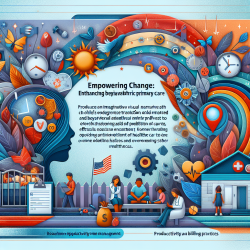Introduction
As practitioners dedicated to improving the lives of children, staying informed and implementing the latest research findings is crucial. The research article titled "Islet Xeno/transplantation and the risk of contagion: local responses from Canada and Australia to an emerging global technoscience" offers valuable insights that can be translated into practice, particularly in the field of online therapy services provided by companies like TinyEYE.
Understanding the Research
The study delves into the complex world of xenotransplantation, a field where animal organs and tissues are used for human therapies. It highlights the public engagement and policy responses from Canada and Australia, emphasizing the importance of public consultation in managing scientific controversies. The research underscores the necessity of a precautionary approach, as evidenced by the temporary moratoriums on clinical xenotransplantation in these countries.
Implementing Research Outcomes
For practitioners in speech-language pathology and online therapy, the research offers several key takeaways:
- Data-Driven Decisions: Just as the study advocates for evidence-based policy decisions, practitioners should rely on data-driven methods to tailor therapy plans for children, ensuring interventions are grounded in proven outcomes.
- Public Engagement: The emphasis on public consultation in the study highlights the importance of involving stakeholders—parents, educators, and children themselves—in the therapy process. This can enhance trust and ensure that therapy goals align with the needs and expectations of all parties involved.
- Precautionary Principle: The moratoriums in Canada and Australia serve as a reminder of the importance of caution in implementing new therapies. Practitioners should continuously evaluate the safety and efficacy of their methods, adapting as new evidence emerges.
Encouraging Further Research
The research also invites practitioners to explore further studies and innovations in their field. By staying abreast of emerging trends and technologies, practitioners can enhance their skills and offer cutting-edge therapies that maximize outcomes for children.
Conclusion
Incorporating research insights into practice is not just about improving individual therapy outcomes but also about contributing to a broader culture of evidence-based practice. By aligning with the principles highlighted in the research, practitioners can ensure they are providing the highest quality of care to children.
To read the original research paper, please follow this link: Islet Xeno/transplantation and the risk of contagion: local responses from Canada and Australia to an emerging global technoscience.










